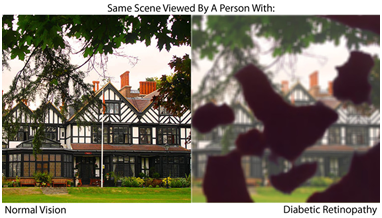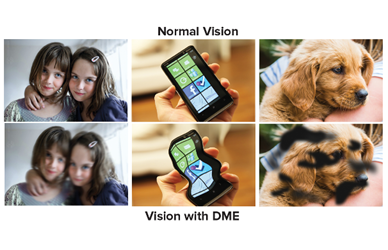What is DIABETIC EYE DISEASE?
Do you have a poor control of sugar intake?
You might want to slow it down as you age. Aside from hearing loss and foot complications to name a few, Diabetes can also lead to blindness. Not only can it lead to Cataract, it can also lead to two (2) conditions:
Early on, diabetic retinopathy is asymptomatic, so once you are diagnosed with diabetes, please have your eyes checked by your Ophthalmologist.
1. DIABETIC RETINOPATHY, a condition which involves changes to retinal blood vessels that can cause them to bleed or leak fluid, distorting vision. It is the most common cause of vision loss among people with diabetes and;
2. DIABETIC MACULAR EDEMA, a result of diabetic retinopathy which involves swelling and accumulation of fluid (edema) in the macula.

DIABETIC RETINOPATHY can be Background, or Proliferative. As the stages progress, more blood vessels that nourish the retina are blocked until it triggers growth of new blood vessels (neovascularization) that have thin, fragile walls that can leak blood which results to severe vision loss and even blindness.
DIABETIC MACULAR EDEMA (DME)
The macula is responsible for the sharp, straight-ahead vision that is used for reading, recognizing faces, and driving. Too much fluid in it can affect vision permanently. Those who have Diabetic Retinopathy are most likely to develop diabetic macular edema (DME).

Photo from: http://www.scienceofdme.org/learn/
Those who have diabetes (type 1 and type 2) are highly suggested to take an annual comprehensive dilated eye exam. These includes:
Visual Acuity Testing – measures ability to see at various distance
Tonometry – measures pressure inside the eye
Pupil Dilation – widens the pupil to examine retina and optic nerve
Optical Coherence Tomography (OCT) – like an “ultrasound” that uses light waves to see detailed images of tissues such as the eye
Depending on your initial tests, your Ophthalmologist may require other tests not mentioned above.
It is best to have an eye exam as early as possible if you are diagnosed with diabetes. It can reduce risk of blindness up to 95% with timely treatment and proper control of sugar and blood pressure.
If you have Proliferative Diabetic Retinopathy or Macular Edema, your doctor may give you option of injecting anti-VEGF, Laser photocoagulation, or combination of both. Your Retina Specialist will help guide you in decision making.
